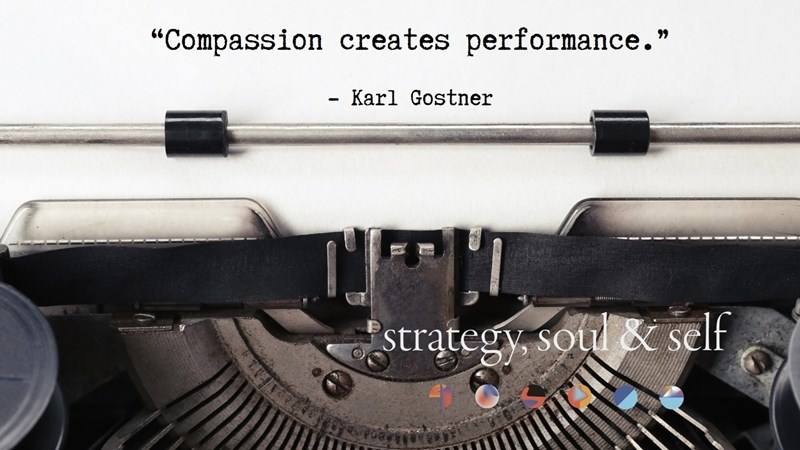Inspiration
Letters from Karl - Compassion And Performance─── 14:09 Tue, 06 Jun 2023

Another motivational message from Karl Gostner, executive and business coach.
Dear friends,
Don’t you love this vintage Borghesani wooden robot bar? That’s my kind of AI ??
Last year, William Kentridge held a solo show at the Royal Academy of Arts in September. Included in the show is this tapestry created in collaboration with The Stephens Tapestry Studio.
The studio is one of those amazing, behind-the-scenes, African centers of excellence. With locations in Eswatini and South Africa, they create iconic works for some of the world’s leading artists.
These small, deep centres of excellence are such powerful catalysts for the economy around them. They are national treasures.
Another is Cape Town’s African Sketchbook which creates magnificent hand-painted fabrics – their wallpaper, inspired by the doyen of South African landscape painting Pierneef, is astonishing … hmm, there’s a whole other letter there, but that’s not where we’re going today. Today is about compassion and performance.
/ STRATEGY
Life is tough. Whilst we might be (perhaps, maybe) emerging from the worst of the pandemic there is much that continues to make life harder. Add to that the trauma of large-scale loss, the economic dislocation, and the fatigue, and the world is a hard place to be. There is a lot that stands in the way of us being our best. We both need compassion and want to be compassionate. Simultaneously, the world demands performance. There are targets to be achieved, milestones to pass. Indeed, the pressure to perform is even more intense given the precarity of it all.
In my work, these two needs are often presented as competing. The leaders I work with grapple with what seems to be a trade-off. Be compassionate or demand performance? Have a good culture or get results? They are often presented in a binary, zero-sum way. One or the other. We have to choose. All too often we then land on the ‘well, we must perform’ side of the equation.
In the background is the annoying niggle that we want to be compassionate. We know that life is hard. We know that without compassion, people disengage. With disengaged people comes a slow slide to poor performance and irrelevance. We know this, yet still, it seems like we must choose performance. Compassion can, must wait.
Yet, the truth is that it must be both. Humans are driven to perform. We are at our best when we are growing. From our first tentative, wobbly steps we want to grow. And we need to be seen. We desire and need connection. And that means both receiving and giving compassion.
In this year’s Global CEO Survey, PWC found that CEOs of companies ranking highest on their customer trust index were “significantly more likely to have nonfinancial outcomes (such as customer satisfaction, employee engagement, and gender, race, and ethnicity representation) tied to their compensation.” Without customer trust, no sales. No sales, no business. Compassion gives performance.
Harvard Law School fellow, Heidi Gardner and INSEAD professor Mark Mortenson’s recent HBR pieces Leaders Don’t Have to Choose Between Compassion and Performance and Managers Are Trapped in a Performance-Compassion Dilemma are great guides to navigating this seeming conundrum.
Earlier this year, they surveyed 300 senior business leaders. 61% reported “struggling to balance employees’ need for support with their company’s drive for high performance.” So, you’re not alone. All leaders are struggling with how to manage this. Both articles are worth reading in full, but here are a few pointers.
First, prioritize making time for compassion.
This means assessing all our tasks and letting go of some. Invariably, over years, there is some reporting or meeting creep. Pausing to assess will allow you to shed those that are no longer necessary. The time you get back can be invested back into intentional connection to see how others are doing.
Doing this helps strengthen communication and information flows. You and I know how difficult it is to share personal challenges that might impact on our work performance. By making the time for compassion, by intentionally exploring where your colleagues are at, you are ‘creating an environment that normalizes conversations about the support people need.’ And if the conversations are happening, if understanding is being built, then you can explore possible solutions and take effective action.
Second, help people to build connections.
Many of your employees will have started in your business during remote or hybrid work. Help them to accelerate their connections with others. Working in a team where people share your values and knowing that others have your back, are two critical variables in determining high levels of engagement and performance. So, creating connections helps performance.
Three, keep communicating purpose, vision, and context.
As Gardner and Mortensen write “Helping employees understand why the pressure exists helps them make sense of it. Relatedly, research shows that employees are more motivated and engaged when they have a sense of purpose, so taking the time to help them understand how their work contributes and connects to the organization’s ultimate objectives can help alleviate stress.”
In brief, it’s not a trade-off. Compassion creates performance. Performance gives us achievement. Achievement gives us meaning. We’re meaning-making machines who need compassion.
/ SELF
It occurred to me that to inject compassion into our businesses means that we probably need to start with ourselves. That insight took me to the Creativity in Business heuristic “Destroy Judgment, Create Curiosity”.
Michael Ray and Rochelle Myer make the point that we all experience ‘voices of judgment’. Some we’ve internalised. Some have external sources. They’re a voice that tells us that we’re not good enough, that prevents us from being curious, and that stops us from exploring our passions. Indeed, it often stops us from doing what we know is right, from being compassionate, because somewhere there is a voice saying ‘you’ve got to get the performance, you don’t have time for this’.
I love how they put it “No person is something called lazy. Laziness is a symptom that something is incomplete, unresolved, uncomfortable. That which is left incomplete and therefore uncomfortable signals a block – usually fear.”
The next time you hear your voice of judgment, ask yourself what is it that is ‘incomplete, unresolved, uncomfortable’? And then do one small thing that might lessen that fear. If you can’t think of something, go for a walk, at least you’re moving forwards!
They end the chapter with a great exercise called “The Eleven Buts”. You can do it like this. Write down a goal that you have. Then list the eleven buts, the reasons you think you can’t achieve the goal ‘But I need…’
Then, re-read the goal and the buts as if a stranger had written them. What would you say about that person? What would you say to them?
/ SOUL
John O’Donohue writes in his poem For a Leader “When someone fails or disappoints you / May the graciousness with which you engage / Be their stairway to renewal and refinement.”
I wish you a week of graciousness with yourself and with others.
All the very best,
Karl
Karl writes his weekly letter for people who want to have a significant impact, live joyful lives, and build a humane world - subscribe here. Get in touch on LinkedIn or Instagram.














